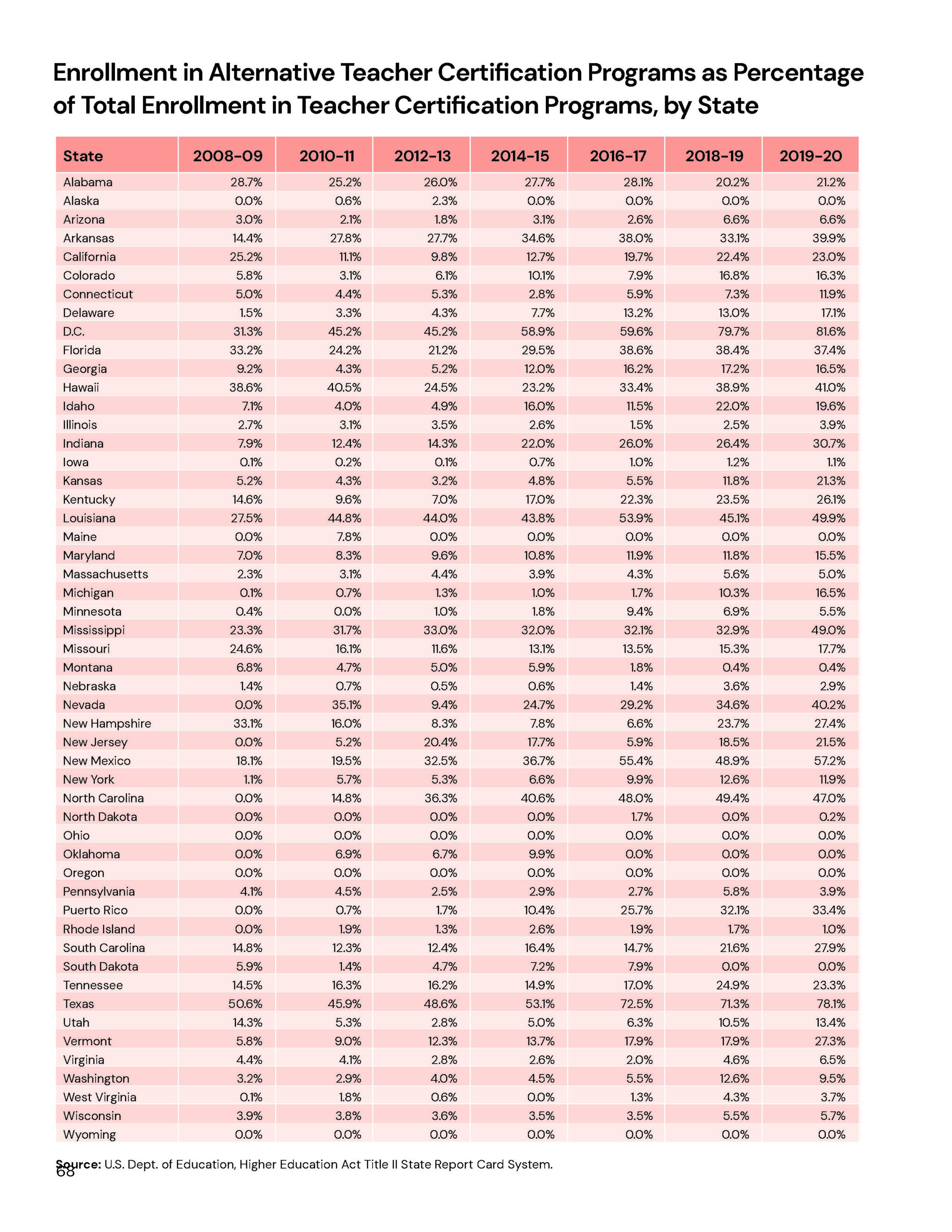Alternative Teacher Certification
In 2011, Nevada lawmakers passed landmark legislation – SB 315 – creating an alternative route to licensure for public school teachers in the state.1 The legislation instructs the Commission on Professional Standards in Education to create an alternative path to licensure for mid-career professionals who complete an approved training course within two years or less.2
In 2019, lawmakers weakened alternative routes to licensure by eliminating a pre-existing “special qualifications” license that allowed college professors and others with significant experience in a field of high need to be issued a provisional teaching license. The original version of this legislation, introduced by the Sisolak administration, also sought to require alternative licensure programs to include in-person components, whereas the 2011 law had allowed all coursework to be done virtually. Fortunately, lawmakers amended out this second provision prior to passage. One year later, Gov. Sisolak ordered the closing of all in-person instruction, which would have eliminated alternative certification.3
Key Points
Traditional licensure has no bearing on student achievement. Researchers at the Brookings Institution have tracked the impact of traditional teacher licensure on student achievement. Their results show that students of teachers who have received a license through alternative means perform no worse than students of traditionally certified teachers. In fact, Brookings’ study shows that even students of unlicensed teachers perform no worse than students of traditionally certified teachers – indicating that licensure has no bearing at all on student achievement.4
Strict certification requirements create an artificial shortage of teachers. Given that teacher licensure has no tangible benefit for children, it is clear that the primary function of licensing is to exclude potential teachers from the marketplace. In fact, the first programs of alternative certification in the nation – those in New Jersey and Texas – were created explicitly to remedy a teacher shortage in those states that had been created by strict certification requirements.5
Certification requirements exclude minority teachers from the classroom. Harvard education scholar Paul Peterson has shown that, in states with genuine, undiluted alternative teacher-certification programs, the population of minority teachers is more likely to reflect the state’s demographics. In states without genuine alternative teacher certification, minorities are likely to be underrepresented among the teacher labor force – indicating that licensure requirements operate to statistically exclude minorities from the classroom.6
Alternative certification programs lead to greater student achievement. While certification has been shown to have no bearing on student achievement, the presence of a genuine path to alternative certification allows more highly qualified professionals to enter the teaching profession, and this benefits students. Test score data from the U.S. Department of Education shows that states with genuine alternative certification have increased student achievement at a far greater pace.7
Recommendations
Allow prospective teachers to test out of coursework requirements. The alternative certification process created by SB 315 can still take two full years for prospective teachers to complete. For talented, mid-career professionals seeking to transfer into the classroom, this barrier to entry is still needlessly onerous. Knowledgeable professionals should be able to have coursework requirements waived if they can achieve a reasonable score on a subject-matter test.
Recognize teaching credentials gained in any other state. While Nevada has reciprocity agreements to recognize teaching credentials gained by individuals in certain other states, credentials gained in several states are not recognized by Nevada. A majority of states recognize licensure gained anywhere in the United States.8 Nevada should as well.

1 Nevada Legislature, 76th Session, Senate Bill 315.
2 Ibid.
3 Nevada Legislature, 80th Session, Senate Bill 41.
4 Robert Gordon et al., “Identifying Effective Teachers Using Performance on the Job,” Brookings Institution, The Hamilton Project, Discussion Paper 2006-01, 2006.
5 Geoffrey Lawrence, “33 Ways to Improve Nevada Education Without Spending More,” NPRI policy study, July 2014.
6 Paul Peterson, “What Happens When States Have Genuine Alternative Certification,” Education Next, Vol. 9, No. 1, 2009.
7 Ibid.
8 Op cit., Lawrence, note 5.
